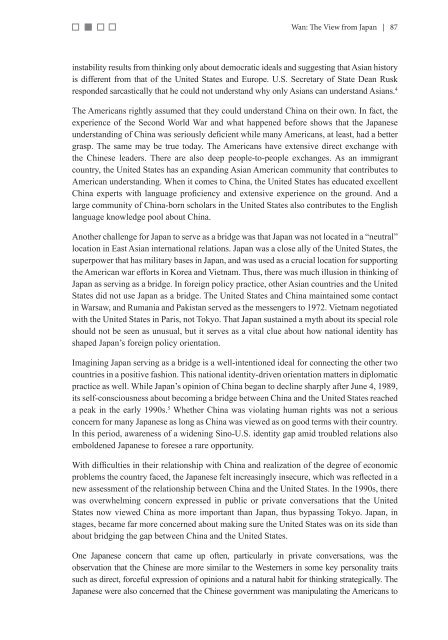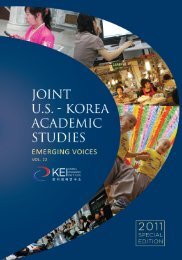the full publication PDF - Korea Economic Institute
the full publication PDF - Korea Economic Institute
the full publication PDF - Korea Economic Institute
Create successful ePaper yourself
Turn your PDF publications into a flip-book with our unique Google optimized e-Paper software.
Wan: The View from Japan | 87<br />
instability results from thinking only about democratic ideals and suggesting that Asian history<br />
is different from that of <strong>the</strong> United States and Europe. U.S. Secretary of State Dean Rusk<br />
responded sarcastically that he could not understand why only Asians can understand Asians. 4<br />
The Americans rightly assumed that <strong>the</strong>y could understand China on <strong>the</strong>ir own. In fact, <strong>the</strong><br />
experience of <strong>the</strong> Second World War and what happened before shows that <strong>the</strong> Japanese<br />
understanding of China was seriously deficient while many Americans, at least, had a better<br />
grasp. The same may be true today. The Americans have extensive direct exchange with<br />
<strong>the</strong> Chinese leaders. There are also deep people-to-people exchanges. As an immigrant<br />
country, <strong>the</strong> United States has an expanding Asian American community that contributes to<br />
American understanding. When it comes to China, <strong>the</strong> United States has educated excellent<br />
China experts with language proficiency and extensive experience on <strong>the</strong> ground. And a<br />
large community of China-born scholars in <strong>the</strong> United States also contributes to <strong>the</strong> English<br />
language knowledge pool about China.<br />
Ano<strong>the</strong>r challenge for Japan to serve as a bridge was that Japan was not located in a “neutral”<br />
location in East Asian international relations. Japan was a close ally of <strong>the</strong> United States, <strong>the</strong><br />
superpower that has military bases in Japan, and was used as a crucial location for supporting<br />
<strong>the</strong> American war efforts in <strong>Korea</strong> and Vietnam. Thus, <strong>the</strong>re was much illusion in thinking of<br />
Japan as serving as a bridge. In foreign policy practice, o<strong>the</strong>r Asian countries and <strong>the</strong> United<br />
States did not use Japan as a bridge. The United States and China maintained some contact<br />
in Warsaw, and Rumania and Pakistan served as <strong>the</strong> messengers to 1972. Vietnam negotiated<br />
with <strong>the</strong> United States in Paris, not Tokyo. That Japan sustained a myth about its special role<br />
should not be seen as unusual, but it serves as a vital clue about how national identity has<br />
shaped Japan’s foreign policy orientation.<br />
Imagining Japan serving as a bridge is a well-intentioned ideal for connecting <strong>the</strong> o<strong>the</strong>r two<br />
countries in a positive fashion. This national identity-driven orientation matters in diplomatic<br />
practice as well. While Japan’s opinion of China began to decline sharply after June 4, 1989,<br />
its self-consciousness about becoming a bridge between China and <strong>the</strong> United States reached<br />
a peak in <strong>the</strong> early 1990s. 5 Whe<strong>the</strong>r China was violating human rights was not a serious<br />
concern for many Japanese as long as China was viewed as on good terms with <strong>the</strong>ir country.<br />
In this period, awareness of a widening Sino-U.S. identity gap amid troubled relations also<br />
emboldened Japanese to foresee a rare opportunity.<br />
With difficulties in <strong>the</strong>ir relationship with China and realization of <strong>the</strong> degree of economic<br />
problems <strong>the</strong> country faced, <strong>the</strong> Japanese felt increasingly insecure, which was reflected in a<br />
new assessment of <strong>the</strong> relationship between China and <strong>the</strong> United States. In <strong>the</strong> 1990s, <strong>the</strong>re<br />
was overwhelming concern expressed in public or private conversations that <strong>the</strong> United<br />
States now viewed China as more important than Japan, thus bypassing Tokyo. Japan, in<br />
stages, became far more concerned about making sure <strong>the</strong> United States was on its side than<br />
about bridging <strong>the</strong> gap between China and <strong>the</strong> United States.<br />
One Japanese concern that came up often, particularly in private conversations, was <strong>the</strong><br />
observation that <strong>the</strong> Chinese are more similar to <strong>the</strong> Westerners in some key personality traits<br />
such as direct, forceful expression of opinions and a natural habit for thinking strategically. The<br />
Japanese were also concerned that <strong>the</strong> Chinese government was manipulating <strong>the</strong> Americans to










